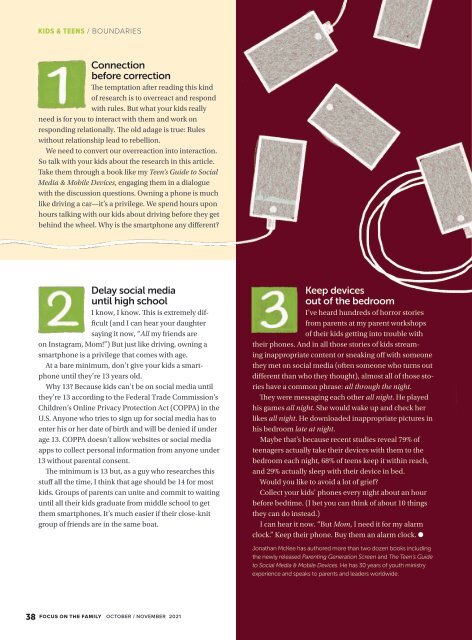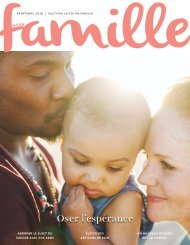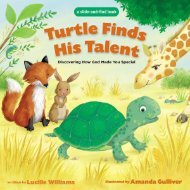Focus on the Family Magazine - October/November 2021
It can be a struggle to raise a family while balancing your work life, social life and relationships. Focus on the Family magazine is here to help! Each complimentary issue delivers fresh, practical Biblical guidance on family and life topics. Every issue comes packed with relevant advice to build up your kids, strengthen your marriage, navigate entertainment and culture, and handle common challenges you may face in your marriage and parenting journeys. Plus you'll find seasonal advice ranging from back-to-school activities to date night tips for you and your spouse.
It can be a struggle to raise a family while balancing your work life, social life and relationships. Focus on the Family magazine is here to help! Each complimentary issue delivers fresh, practical Biblical guidance on family and life topics.
Every issue comes packed with relevant advice to build up your kids, strengthen your marriage, navigate entertainment and culture, and handle common challenges you may face in your marriage and parenting journeys. Plus you'll find seasonal advice ranging from back-to-school activities to date night tips for you and your spouse.
- No tags were found...
You also want an ePaper? Increase the reach of your titles
YUMPU automatically turns print PDFs into web optimized ePapers that Google loves.
KIDS & TEENS / BOUNDARIES<br />
FOSTER ADOPTION / KIDS & TEENS<br />
C<strong>on</strong>necti<strong>on</strong><br />
before correcti<strong>on</strong><br />
The temptati<strong>on</strong> after reading this kind<br />
of research is to overreact and resp<strong>on</strong>d<br />
with rules. But what your kids really<br />
need is for you to interact with <strong>the</strong>m and work <strong>on</strong><br />
resp<strong>on</strong>ding relati<strong>on</strong>ally. The old adage is true: Rules<br />
without relati<strong>on</strong>ship lead to rebelli<strong>on</strong>.<br />
We need to c<strong>on</strong>vert our overreacti<strong>on</strong> into interacti<strong>on</strong>.<br />
So talk with your kids about <strong>the</strong> research in this article.<br />
Take <strong>the</strong>m through a book like my Teen’s Guide to Social<br />
Media & Mobile Devices, engaging <strong>the</strong>m in a dialogue<br />
with <strong>the</strong> discussi<strong>on</strong> questi<strong>on</strong>s. Owning a ph<strong>on</strong>e is much<br />
like driving a car—it’s a privilege. We spend hours up<strong>on</strong><br />
hours talking with our kids about driving before <strong>the</strong>y get<br />
behind <strong>the</strong> wheel. Why is <strong>the</strong> smartph<strong>on</strong>e any different?<br />
worthy of love<br />
How to help children placed through<br />
foster care feel safe, valued and<br />
welcomed into your family<br />
BY JOHNSTON MOORE<br />
ILLUSTRATIONS BY MAÏTÉ FRANCHI<br />
Delay social media<br />
until high school<br />
I know, I know. This is extremely difficult<br />
(and I can hear your daughter<br />
saying it now, “All my friends are<br />
<strong>on</strong> Instagram, Mom!”) But just like driving, owning a<br />
smartph<strong>on</strong>e is a privilege that comes with age.<br />
At a bare minimum, d<strong>on</strong>’t give your kids a smartph<strong>on</strong>e<br />
until <strong>the</strong>y’re 13 years old.<br />
Why 13? Because kids can’t be <strong>on</strong> social media until<br />
<strong>the</strong>y’re 13 according to <strong>the</strong> Federal Trade Commissi<strong>on</strong>’s<br />
Children’s Online Privacy Protecti<strong>on</strong> Act (COPPA) in <strong>the</strong><br />
U.S. Any<strong>on</strong>e who tries to sign up for social media has to<br />
enter his or her date of birth and will be denied if under<br />
age 13. COPPA doesn’t allow websites or social media<br />
apps to collect pers<strong>on</strong>al informati<strong>on</strong> from any<strong>on</strong>e under<br />
13 without parental c<strong>on</strong>sent.<br />
The minimum is 13 but, as a guy who researches this<br />
stuff all <strong>the</strong> time, I think that age should be 14 for most<br />
kids. Groups of parents can unite and commit to waiting<br />
until all <strong>the</strong>ir kids graduate from middle school to get<br />
<strong>the</strong>m smartph<strong>on</strong>es. It’s much easier if <strong>the</strong>ir close-knit<br />
group of friends are in <strong>the</strong> same boat.<br />
Keep devices<br />
out of <strong>the</strong> bedroom<br />
I’ve heard hundreds of horror stories<br />
from parents at my parent workshops<br />
of <strong>the</strong>ir kids getting into trouble with<br />
<strong>the</strong>ir ph<strong>on</strong>es. And in all those stories of kids streaming<br />
inappropriate c<strong>on</strong>tent or sneaking off with some<strong>on</strong>e<br />
<strong>the</strong>y met <strong>on</strong> social media (often some<strong>on</strong>e who turns out<br />
different than who <strong>the</strong>y thought), almost all of those stories<br />
have a comm<strong>on</strong> phrase: all through <strong>the</strong> night.<br />
They were messaging each o<strong>the</strong>r all night. He played<br />
his games all night. She would wake up and check her<br />
likes all night. He downloaded inappropriate pictures in<br />
his bedroom late at night.<br />
Maybe that’s because recent studies reveal 79% of<br />
teenagers actually take <strong>the</strong>ir devices with <strong>the</strong>m to <strong>the</strong><br />
bedroom each night, 68% of teens keep it within reach,<br />
and 29% actually sleep with <strong>the</strong>ir device in bed.<br />
Would you like to avoid a lot of grief?<br />
Collect your kids’ ph<strong>on</strong>es every night about an hour<br />
before bedtime. (I bet you can think of about 10 things<br />
<strong>the</strong>y can do instead.)<br />
I can hear it now. “But Mom, I need it for my alarm<br />
clock.” Keep <strong>the</strong>ir ph<strong>on</strong>e. Buy <strong>the</strong>m an alarm clock. •<br />
J<strong>on</strong>athan McKee has authored more than two dozen books including<br />
<strong>the</strong> newly released Parenting Generati<strong>on</strong> Screen and The Teen’s Guide<br />
to Social Media & Mobile Devices. He has 30 years of youth ministry<br />
experience and speaks to parents and leaders worldwide.<br />
CREDIT TK<br />
“ANNA* BROKE THIS,” our<br />
s<strong>on</strong> said, holding a shattered ornament<br />
in his hand.<br />
I told him to do his best to clean it<br />
up and <strong>the</strong>n ask Anna to come see my<br />
wife and me in our room.<br />
Anna had been in our home <strong>on</strong>ly<br />
about an hour. Born in a country halfway<br />
around <strong>the</strong> world, she had come<br />
to <strong>the</strong> United States with her biological<br />
fa<strong>the</strong>r a few m<strong>on</strong>ths earlier. Not<br />
l<strong>on</strong>g after her arrival, she’d been<br />
placed with a family that had taught<br />
her how to speak English.<br />
Unfortunately, this family had also<br />
shown Anna what c<strong>on</strong>diti<strong>on</strong>al love<br />
looked like. They’d told her that if she<br />
didn’t behave properly, she would<br />
have to leave <strong>the</strong>ir home. Naturally,<br />
her humanity, her traumatic past<br />
and her age—she was <strong>on</strong>ly 6 at <strong>the</strong><br />
time—made it impossible for her to<br />
meet <strong>the</strong>ir standards, and <strong>the</strong>y had<br />
requested she be placed elsewhere.<br />
Anna had come to our home in<br />
tears. She wasn’t crying because she<br />
missed <strong>the</strong> o<strong>the</strong>r family, but because<br />
children aren’t designed to experience<br />
this kind of rejecti<strong>on</strong>. I am sure<br />
<strong>the</strong> o<strong>the</strong>r family’s biological children<br />
had misbehaved plenty of times. The<br />
difference was that <strong>the</strong>y didn’t fear<br />
rejecti<strong>on</strong>. They were part of <strong>the</strong> family.<br />
Anna wasn’t.<br />
A few minutes after we sent our s<strong>on</strong><br />
to fetch Anna, she showed up in our<br />
doorway, petrified. Her eyes reflected<br />
her distress as she admitted breaking<br />
<strong>the</strong> ornament. Our hearts broke<br />
for her. We sensed she feared being<br />
rejected again.<br />
We assured Anna <strong>the</strong>re was nothing<br />
she could do that would cause us to<br />
make her leave. Up<strong>on</strong> hearing those<br />
words, she physically relaxed. We<br />
hugged her and <strong>the</strong>n sent her <strong>on</strong> her<br />
way to get to know her new siblings.<br />
God used a broken ornament to<br />
help us make our new daughter feel<br />
valued and welcome. She needed<br />
to see she was not an intruder but a<br />
member of <strong>the</strong> family. Eventually we<br />
adopted her. And she’s been a part of<br />
<strong>the</strong> family for <strong>the</strong> past 15 years.<br />
Whenever a new child is placed<br />
in a home through foster care or<br />
adopti<strong>on</strong>, he or she needs to feel<br />
safe, welcome and part of <strong>the</strong> family,<br />
especially if that child has experienced<br />
trauma. Here are ways o<strong>the</strong>r<br />
parents have welcomed children<br />
into <strong>the</strong>ir homes:<br />
38<br />
FOCUS ON THE FAMILY<br />
OctOber / NOvember <strong>2021</strong><br />
OctOber / NOvember <strong>2021</strong> FOCUS ON THE FAMILY 39

















